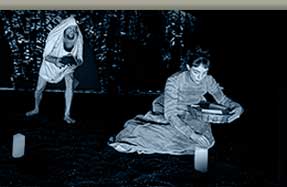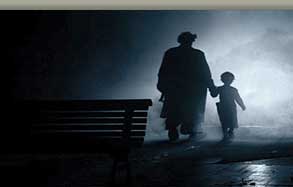





1.6 · FOUR VISIONS OF THEATRE: ANGÉLICA LIDDELL AND HER GENERATION
Por Ewelina Topolska
2. History, identity, community: Laila Ripoll
It is probably safe to say that Laila Ripoll’s artistic work stems from a sense of responsibility for the community. One can easily imagine that, had not her parents been theatre artists themselves1 and had they not, inadvertently, passed on their passion for the stage to their daughter2, Ripoll might have become a doctor volunteering in a refugee camp3, or a political activist trying to make Spain a better place, at least a tiny little bit better4. Unlike Angélica Liddell, an individualist par excellence, Ripoll, quite logically, views theatre-making as a common and communitarian effort, which is reflected in her choice of topics and her methods of work (oftentimes she writes in duets or even trios).
An umbrella-topic of Ripoll’s work is the community of Spanish people, living and dead, with their traditions, history, their folklore, superstitions and adages, their writers and painters, their heroes, victims and miscreants. Spain is her one greatest concern –“I love Spain, but to the same extent it makes me suffer”5, confesses the author in a recent interview (Vila 2018), and the spectators can intuit this pain, stemming from a genuine care, in most, if not all, of Ripoll’s plays.
Before Ripoll turned to playwrighting, she had tried acting, but gradually evolved towards direction and writing which agree better with her introverted nature6. A keen admirer of playwrights of the Spanish Golden Age like Calderón de la Barca or Lope de Vega, and recognising herself as a debtor to such innovators of Spanish literature as Cervantes or Quevedo7, during the initial phase of her career Ripoll dedicated herself, alongside the theatre group Micomicón, founded in 1991 by herself and other three graduates of the School of the National Company of Classical Theatre8, to reviving the memory of the respected authors of the Iberian and, more generally, European tradition. After realising several productions based on the texts of such stars of the past epochs as Lope de Vega, Shakespeare or García Lorca, which were directed either by Ripoll or her stage, and at the same time life, partner, Mariano Llorente, in 1999 Micomicón finally ventured to propose a performance whose script was written by Ripoll herself: The Besieged City (La ciudad sitiada). The play, widely acclaimed by the audience and the critics alike9, set the direction for further productions, presenting atrocities human beings are capable of when the hell of war breaks lose.
This successful debut as a playwright encouraged Ripoll to pursue her literary ambitions further, which resulted in a continuous stream of remarkable texts (and shows, as most of Ripoll’s plays have been staged). Among Ripoll’s production in the first decade of the 21st century three plays deserve special attention: Atra Bilis, The Lost Children (Los niños perdidos) [fig. 1] and Saint Perpetua (Santa Perpetua), published under a unifying title Trilogy of Memory (Ripoll, 2013). Through these texts Ripoll established her main operating ground – Spanish history10, and her unique grotesque style, which is perceived by some as a part of the tradition developed by Valle-Inclán, and later carried on by such representatives of the New Spanish Theatre as Romero Esteo, Nieva or Riaza, but also, to some extent, by Lidia Falcón or Carmen Resino (Reck, 2012, 56). She also proved, again and again, that few contemporaries can consider themselves her equals when it comes to the mastery of language11.
Among the plays Ripoll created in the course of the current decade, undoubtedly two deserve our special attention: The Blue Triangle (El Triángulo azul) and Where the Forest Thickens (Donde el bosque se espesa), both co-auhored by Mariano Llorente and directed by Ripoll. The former text, which earned the authors the National Dramatic Literature Award, depicts horrifying experiences of the Spanish prisoners in the Nazi concentration camp of Mauthausen during the Second World War; the latter, also closely connected with the motif of war, offers a picture of a Spanish family haunted by ghosts of the past. They lead the main characters, a mother and a daughter, to the Balkans, where they have to face a life-changing, but also redeeming truth.
Apart from their indubitable artistic value and ethical commitment, Ripoll’s plays serve an important educational purpose, informing the spectators, especially younger generations, of certain episodes in the Spanish history most of them have never heard about12. Still, it must be acknowledged that this pronounced site-specificity renders most of Ripoll’s plays quite hermetic. The general public outside Spain has only a faint idea of the Spanish Civil War (if any), so delving into the nuances of a conflict which, unlike the Second World War, was limited only to the Iberian Peninusla and, because of the time distance, is completely absent from the modern media outside Spanish-speaking circles, may turn out to be quite challenging13.
Nevertheless, it must be highlighted that Ripoll wrote and directed a couple of plays that do not fit in the strictly historical framework, and which show the author’s commitment to the feminist cause. The first in the series was A Few Small Nips (Unos Cuantos Piquetitos), written by Ripoll in 1998 and directed in 2001 by Mike Gómez de Segura [fig. 2]. The play’s title evokes the homonymous painting by Frida Kahlo14 and alludes to the suffering of women at the hands of the dominant sex. Through this play Ripoll voices her protest against gender violence, as the cries of the real victims of domestic abuse oftentimes are too quiet for us to hear – the battered woman in the play barely speaks.
Another play with a feminist touch written and directed by Ripoll was Tree of Hope15 (Árbol de la esperanza, 2008). On this occasion the figure of Frida Kahlo is not only alluded to, but takes the main role. This play, as well as Pro-brides16 (Pronovias), talk about women whose bodies have been deformed in life-threatening accidents/terrorist attacks, and who try to deal with their suffering by resorting to dark humour and distancing sarcasm. Women who
[d]o not give up under any pretext. No matter if they undergo rape, mutilation, diseases. Their bodies, although broken, are a living memory of the past suffering and a token of courage. Their misfortunes did not influence their souls, and if so, only to make them stronger. Their souls remained unaffected, able to disconnect from their own body and from the stereotypes generated by the society. They make efforts to find their place in the society, despite being different (Laurence, 2017: 15).
Still, sometimes the pain is too much to bear, especially when one is young and has not yet had time to acquire resources to stand up to the cruelty of the adults. This is the case of the main character of The Wayward17(Descarriadas), who, battered by her father and tortured by her guardians in a Francoist youth custody centre for wayward (and often pregnant) girls, jumps to her death after her new-born child is forcibly taken away from her.
Once again Ripoll plays give voice to those most vulnerable. “The things I write about are things I want to throw up, things that upset me” –she explains in an interview with Henríquez (2005, 120), stressing that stories of children are particularly absent from the public domain18. (…) It is not just. It is a problem of justice” –she concludes. In the end, the common denominator of all her plays is the defence of human rights, dignity and freedom. Ripoll expresses a strong belief that “all theatre is political” (Vila, 2018), and she does not back away from making politics even at the price of censorship or rejection in certain circles.
1 Ripoll’s mother, Concha Cuetos, is an actress, whereas her father an audiovisual producer.
2 As Ripoll explained in her radio interview with Jordi Batallé (2016), her parents were not very enthusiastic about her career choice.
3 When asked what other occupation she could envision for herself, Ripoll pointed precisely that of a doctor (Babelia, 2017).
4 Ripoll actually is a member of Amnesty International and the UNHCR (Vila, 2018).
5 All translations of quotes into English by Ewelina Topolska.
6 “My shyness is nearly a sickness, but I’ve learnt to conceal it”- she confessed in an interview (Vila, 2018).
7 During a talk on the radio RFI, Ripoll asserted the classical authors taught her “Everything. Everything about the theatre. On the level of language, rhythm, on the level of poetry, images, on the level of theatre carpentry, of the trade, at least I learnt everything form them, everything.” (In Batallé, 2016).
8 More information available on the company’s website: http://apriorigt.org/producciones-micomic%C3%B3n
9 The play was awarded several national prizes: “Arcipreste de Hita” for the best actress, “José Luis Alonso” for the best director , “Caja España” for the best dramatic text, Primer Premio Certamen de Directoras de Escena de Torrejón (best director). Still, not all the critics shared in the enthusiasm (Perales, 1999).
10 Ripoll feels that resorting to the past lets her acquire a necessary distance from the present, which she find too overwhelming to engage with directly through her art (Vila, 2018).
11 An extensive comment on the lexical richness and exactness of Ripoll’s texts can be found in the Foreword by Eduaro Pérez-Rasilla in the Trilogy of Memory (Ripoll, 2013).
12 She stresses the importance of the educational dimension of her work in her radio interview with Jordi Batallé (2016).
13 Notwithstanding the possible difficulties in reception, some of Ripoll’s plays have been translated into other languages and presented in non-Spanish speaking countries. Such is the case of The Blue Triangle, The Border (La frontera) or The Lost Children (Los niños perdidos)
14 Painted by Kahlo in 1935, the picture, showing Frida’s apparently dead and badly wounded body on a bed, beside which her husband, Diego Rivera, stands with a knife in his hand, expresses Kahlo’s torment after discovering Rivera’s affair with her sister, Cristina.
15 Once again Ripoll employs a title of Kahlo’s painting as the title of her text, paying her tribute to the eminent individuals of previous generations that shape the identity of the present ones.
16 On one hand, the name evokes the famous chain of wedding shops. Additionally though, the prefix “pro” is a subtle allusion to the pro-sthesis one of the friends visiting the wedding shop, where the play is set, wears.
17 The premiere is scheduled for September 2018 in the Teatro del Barrio, in Madrid. According to the information provided by the author, Ripoll wrote the play in January 2018.
18 Ripoll has engaged with the topic of children in yet another way, writing a children’s theatre play The Milkmaid’s Tale – We’re Going to Break Jugs (El cuento de la lechera - Vamos a romper cántaros 2006).
![]()
Don Galán. Revista audiovisual de investigación teatral. | cdt@inaem.mecd.es | ISSN: 2174-713X | NIPO: 035160842
2018 Centro de Documentación Teatral. INAEM. Ministerio de Educación, Cultura y Deporte. Gobierno de España. | Diseño Web: Toma10
Inicio | Consejo de Redacción | Comité Científico | Normas de Publicación | Contacto | Enlaces